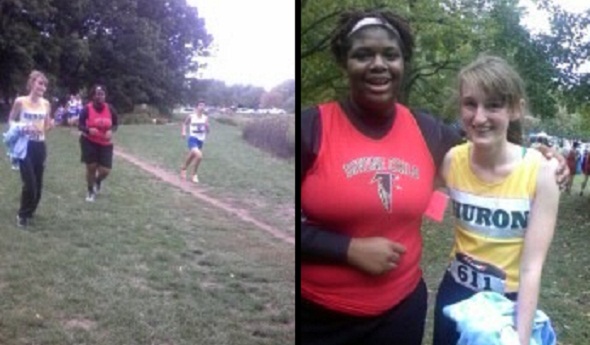
A Fantastic First-Time Finish
October 15, 2012
By Geoff Kimmerly
Second Half editor
Give Mariah Fuqua credit for trying something many others would not.
Throwers – who toss the shot and discus during the spring track and field season – are not the ones who usually cross over into cross country during the fall.
It’s not that it can’t happen. It just doesn’t. Mention to most the idea of running 3.1 miles for fun, on top of a few hundred miles during training, and the response will probably be a laugh – if not a strange look.
“I was going to do it freshman year, and I talked my mom out of it so I could do basketball conditioning instead,” Fuqua said. “I thought (cross country) would be the hardest thing I’d ever have to do in my life.”
But Fuqua, a junior at Dearborn Divine Child, had a plan when she came out as a sophomore. She thought of it as another way to get in shape for hoops – and was so pleased with her improvement in fitness that she came out for cross country again this fall, although she is no longer playing basketball and never made it more than a mile and a half last season without stopping to walk.
Fuqua has continued to make strides this season, but heading into the Sept. 22 Detroit Catholic Central Invitational hadn’t strode over the finish line.
“The toughest part is convincing yourself,” Fuqua said. “It takes a lot to bring yourself to even think you’ll be running 3.1 miles, running non-stop.”
The DCC course at hilly Cass Benton Park is one of the toughest in the state, so that wasn’t going to be the day. She figured she’d run through a mile and a half and be done.
But as she neared one of those hills, she saw a runner from Ann Arbor Huron cheering her on from the top.
'You can do it!'
Alexandria Cell has been a distance runner since she was 9. The Ann Arbor Huron junior was an individual qualifier at last season’s MHSAA Cross Country Finals at Michigan International Speedway, and she finished a solid 67th of 238 runners with a time of 19 minutes, 21 seconds.
If running comes naturally to her, so does being a good teammate. And that’s why it made perfect sense that Cell – who finished runner-up in the long-finished varsity race – was still on the course cheering on her junior varsity teammates during the open run that finished off the meet.
Cell considers herself “definitely a hyper person.” But that’s not why Fuqua recognized her coming down the hill near the halfway point.
Instead, it was the color of Cell’s hooded sweatshirt after seeing her also cheering everyone on at the starting line.
Now, Cell was yelling directly to Fuqua, “Good job! You can do it! Keep going!”
Building toward a fantastic finish
Divine Child girls cross country coach Tony Mifsud and his staff emphasize running as a lifestyle. All are welcome. He and his assistants talk to new runners one-on-one to find out their goals for being part of the team – be they competition, fitness or social-focused.
Fuqua’s goal last season was to run one mile at a time. “We started with five minutes, 10 minutes … and she had a great attitude,” Mifsud said. “But this year, we had a different mindset: to finish. Our goal with her, number one, was to forget about time. Fifteen minutes or 55, whatever (to finish), we’ll get you there.”
Assistant coach Jack Benitez set up a plan specific to Fuqua, who embraced it. She continued to improve. On the tough DCC course, Fuqua was looking good to make it two miles on the fly.
“I’m so happy she made it to a mile and a half, and it’s a loop course, so you do it twice,” Mifsud said. “I’m saying, ‘Mariah, Mariah, run like the wind. Sing like the wind. Sing a song if you’re tired, in your mind. Say a poem, something that will change the focus on pain (to) on the finish line.’
“I can see it developing in my mind that this is going to be great, and of all places at probably one of the toughest courses in the state to run,” Mifsud added. “And lo and behold, we see this young lady out of nowhere running with her. And I’m thinking, this is even better.”
That's just Allie
As Fuqua approached that hill at the 1½-mile mark, Cell ran down it and toward her.
At first, Cell ran around Fuqua a few times, willing her forward. Then she started running with her, and soon Fuqua mentioned she’d never finished a race.
Fuqua told Cell she wanted to stop at two miles. Cell convinced her she could keep going. So they did. They didn’t see a two-mile mark, but ran past two of Fuqua’s coaches, who told her she’d already run past it and might as well keep going.
That, in itself, was something Fuqua never thought she could do. Together, she and Cell moved through the final mile.
“When our team saw it, we thought, ‘That’s just Allie.’ With Allie, it doesn’t matter if you’re the slowest person or just started (running), she wants to cheer you on,” Huron coach Tim Williams said. “Her thought is everybody should be cheered on, no matter what.”
The boys open race had begun, and some of those runners had caught up with Fuqua and Cell. They too cheered on the pair as they passed them by.
“I told her thank you, and that I was going to give her a hug. Because when we were running up to the finish line, it was really emotional,” Fuqua said. “She said, ‘I’d really like a hug, but we can do it after.’”
“Here she comes up the hill at the finish line. And I don’t know what made people stay that late, but hundreds of them are at the finish line,” Mifsud said. “Maybe they sensed something. There was all this vibe, all this noise. And then it was Allie and Mariah, and it was just beautiful. They hugged each other and started crying, and we were crying. It was amazing.”
Be the example
Give Alexandria Cell credit. She thinks what she did was nothing to fuss over. Anyone else would’ve done the same, given that opportunity.
She’s used to running lots of miles. She was already on the course. She needed a cool-down anyway.
“It was easy on my part. It was just fun to be able to support her,” Cell said. “Oh my gosh, she was amazing! I’m glad she got the support from her team and friends. It’s enough to drive people to do things they’ve never done before.”
And give Mariah Fuqua credit for finishing something many wouldn’t start.
Before, she convinced herself to keep running because when she was done, she wouldn’t have to run again for a few days.
Now, she tells herself to keep going so she can see how much she’s improved.
Her time that day in Northville was 49:37. She’s finished four more races since that afternoon.
And she’s going to run cross country again next season. She’s always loved the practices. The team is like another family. And now, the meets are more fun too.
“It’s really weird. I never thought I’d be in this situation to where I’d have to talk about it when people ask me or congratulate me, or people cheer for me when I’m running because they’ve heard about this race,” Fuqua said. “I didn’t think too much about it at the time. I had just finished the race and I was proud of myself for that. I didn’t think I’d be such a big inspiration at the time.
“Then my parents and coaches told me I’m doing something a lot of people can’t do, and I actually finished it. So that shows a lot of people, who will look up to you for this, it proves that throwers or someone with the same build can do this sport.”
PHOTOS: (Top) Ann Arbor Huron junior Alexandria Cell and Divine Child junior Mariah Fuqua turn toward the finish at the Detroit Catholic Central Invitational. (Middle) Fuqua and Cell celebrate Fuqua's first completed race. (Photos courtesy of Dearborn Divine Child.)
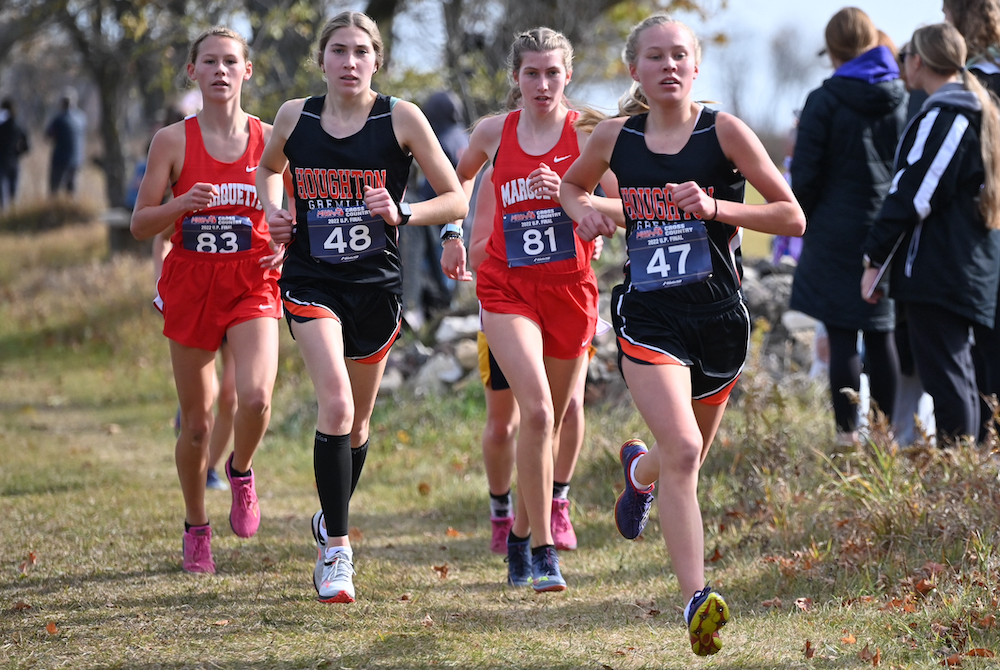
Hancock, Munising Reign Again, While Marquette Wins Matchup of Rivals
By
John Vrancic
Special for MHSAA.com
October 22, 2022
FLAT ROCK — There was a feeling the race for the Upper Peninsula Division 1 girls championship would be a close one here Saturday.
That’s exactly how it played out as Marquette edged two-time reigning champion Houghton 35-37. Third-place Sault Ste. Marie scored 104 points.
“The girls did fantastic,” said Marquette coach Derek Marr. “I’m impressed with the way they came through. We were down slightly after two miles, then they really picked it up. I applaud the Houghton girls for their effort. They really went after it.”
Houghton freshman Tessa Rautiola won the 3.1-mile race in 20 minutes, 11 hundredths of a second. She was followed by Sault senior Cassandra Gallagher (20:07.7) and Marquette freshman Ella Fure (20:13.69).
“I just wanted to enjoy the last race of the season,” said Rautiola. “I’m happy with how everything went. We’re pretty happy with our performance. I think this will just make us work harder next year.”
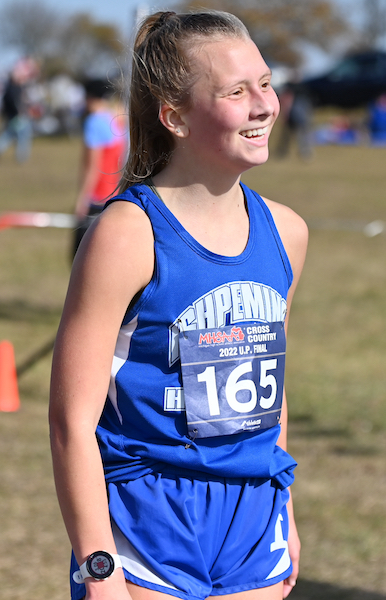 Gallagher achieved a personal record by one second.
Gallagher achieved a personal record by one second.
“I’m very happy with that,” she said. “I’m also happy with how our team did. I didn’t want to go out too hard today. I was in 10th place at the mile mark. This was my last high school cross country race and I really wanted to give it my all. I tried to catch Tessa, but she ran a real good race. We had nice weather. There were a lot of hills out there, but I liked the course.”
Fure said this was a learning experience for her.
“I learned to work with our team and trust in myself,” she added. “I tried to spread out my energy, which takes a lot of practice. My pacing didn’t go as well in the past. We had been running on flatter courses the last couple weeks to save it for the Finals. We had a few hills out there today, and I had to get used to that all over again. I appreciate all the support I received from our team and coaches.”
Marquette placed the third, fourth, seventh, 10th and 13th placers to edge Houghton, which had finishers in first, fifth, eighth, 11th and 14th. Sophomore Monet Argeropoulos followed Fure in fourth, with junior Abby Harma crossing the line seventh for Marquette. Sophomore Lily Ross was fifth for Houghton, and junior Ayla Miller was eighth.
Division 2
Hancock repeated as Division 2 champion with 23 points, followed by Ishpeming with 40 and Powers North Central at 68.
Ishpeming junior Lola Korpi retained her individual title in 20:18.81, followed by Manistique freshman Maya Carlson (21:26.38) and Bessemer (Gogebic) senior Natalie Stone (21:31.6).
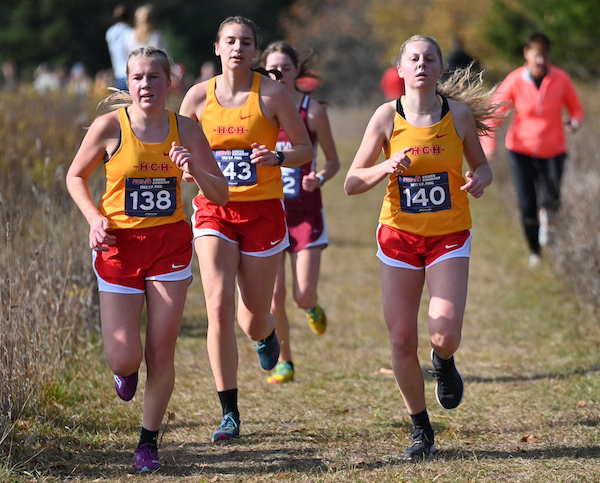 “That’s awesome,” said Korpi, who had been battling a chest cold. “I was going for time. I’m still battling a chest cold and struggled a little with my breathing.
“That’s awesome,” said Korpi, who had been battling a chest cold. “I was going for time. I’m still battling a chest cold and struggled a little with my breathing.
“We had a full team for the first time this year. I’m so happy the girls decided to run. Hancock was tough to beat. There was a little more pressure trying to defend my title, but it’s really nice to bring something back to our school.”
Carlson was also happy with the way everything fell into place.
“We had only four runners today, but still did good as a team,” she said. “I thought I had a chance to win it, but then I just wanted to stay in second place and finish with her (Stone). I think this was my best race of the year. I got stronger as the race went on. I did some races during the summer, and that helped a lot.”
Hancock surged on the strength of four top-10 individual placers – sophomore Ella Keranen in fifth, senior Maylie Kilpela in sixth, sophomore Rayna Towles in seventh and senior Liana Berg in ninth.
Division 3
Munising captured its third consecutive title with 26 points, followed by Eben Junction Superior Central at 71 and Stephenson with 97.
“We knew what we wanted to do this season and came out of here with a huge win,” said Munising coach Mark Kinnunen. “This just shows what hard work and leadership can do for you, and our senior leadership was as strong as it ever was.
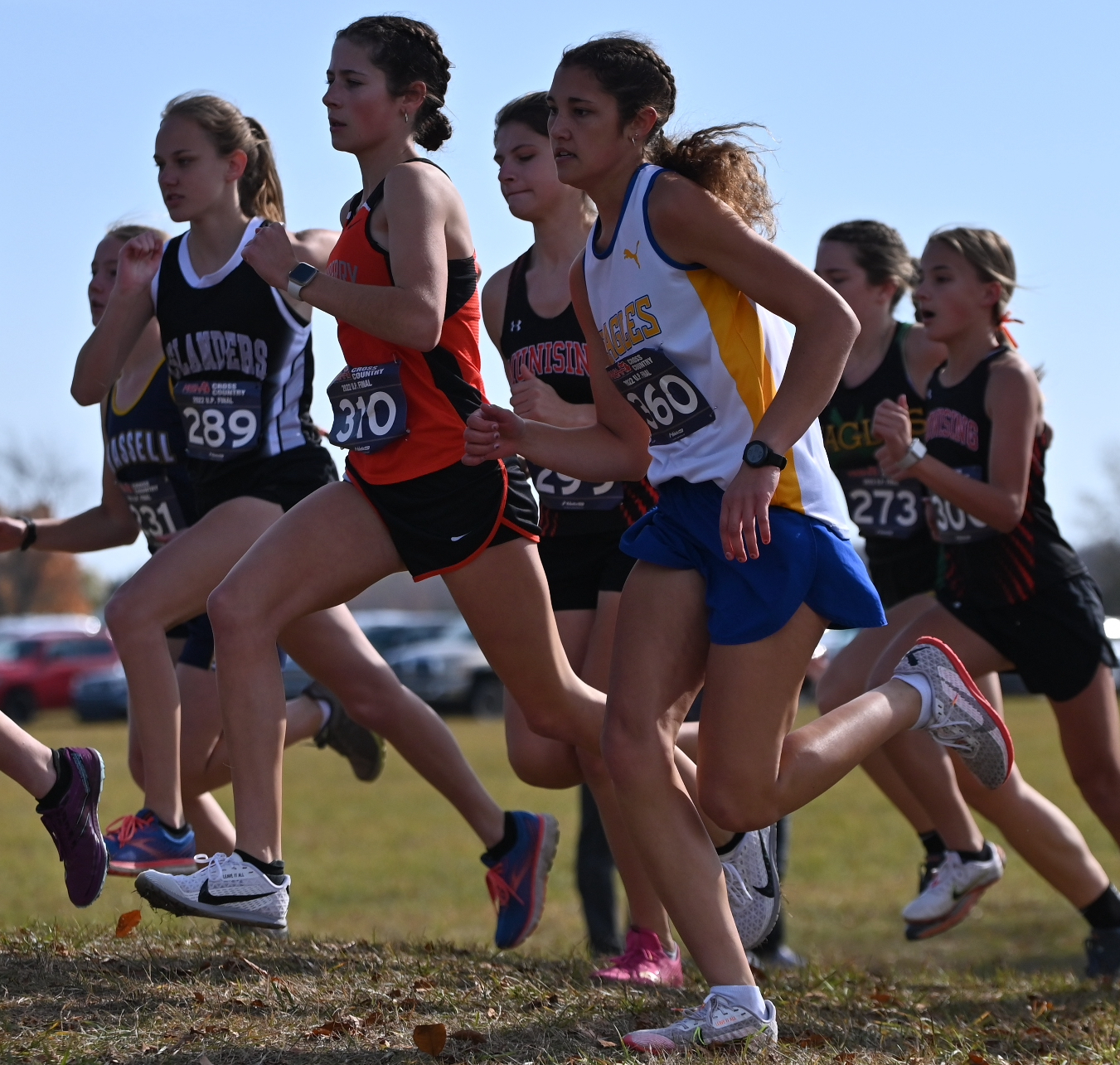 “Competing with Superior Central is awesome. It’s fun having the two schools do so well. We went from having just one runner to earning three straight U.P. titles. I ran for Fran (former coach DesArmo) and learned a lot from him. It’s an exciting time to be coaching this team.”
“Competing with Superior Central is awesome. It’s fun having the two schools do so well. We went from having just one runner to earning three straight U.P. titles. I ran for Fran (former coach DesArmo) and learned a lot from him. It’s an exciting time to be coaching this team.”
Newberry freshman Samantha Taylor earned the top individual honor in 20:06.34, and junior teammate and 2021 champion Kaylen Clark was runner-up in a season-best 20:18.09.
“I’m obviously disappointed I didn’t win, but happy for Sam. She had an amazing season,” said Clark. I’m happy with the progress I made this year. We should be able to compete as a team next year, which will make it more fun. I gave it everything I had. I plan on training real hard. This just makes me hungrier for it.”
Munising senior Monique Brisson placed third (21:36.09), followed by classmate Hattie Cota (21:54.33).
“I think it’s pretty cool the two Alger County schools finished on top,” Brisson said. “We know each other pretty well. I’m proud of our team and definitely happy for them. It’s a pretty hard course, but I’m obviously capable of better. I’m happy for Hattie. She finished strong.”
PHOTOS (Top) Houghton's freshman Tessa Rautiola (47) and sophomore teammate Lily Ross (48), and Marquette freshman Ella Fure (83) and sophomore Monet Argeropoulos (81) run together during the Division 1 race. (2) Ishpeming's Lola Korpi smiles after she finishes the Division 2 Final. (3) Hancock's Ella Keranen (138), Rayna Towles (143), and Maylie Kilpela (140) run together during the Division 2 Final. (4) Competitors break away from the start during the Division 3 Final. (Photos by Cara Kamps.)

